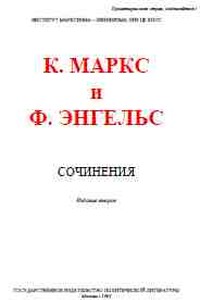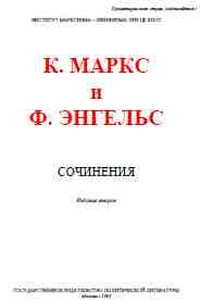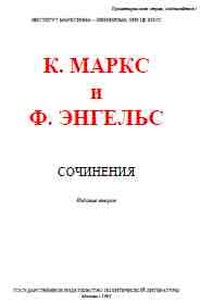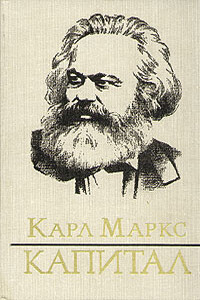«Но канцлер красноречив насчет «бедности»… «Подумайте о тех, которые находятся на краю этой области… Заработная плата… в других отраслях, правда, не увеличилась… Человеческая жизнь в девяти случаях из десяти есть просто борьба за существование»».
Теперь сравним с этим Маркса (т. I, 1 изд., стр. 640; 4 изд., стр. 618). Здесь опять вместо передачи самой бюджетной речи буквально та же самая мозаика вырванных из общей связи фраз, как в «Теории вексельного курса». И здесь он опять-таки ссылается в качестве источника не на нее, а прямо на речь Гладстона в палате общин 7 апреля 1864 года. А затем далее говорится: «Постоянные вопиющие противоречия в бюджетных речах Гладстона за 1863 и 1864 гг. один английский писатель характеризует следующей цитатой из Мольера» (следует вышеприведенное четверостишие Мольера).
Ясно, что Маркс заимствовал из этой книги не только цитату из Мольера, но также и придуманные автором «Теории вексельного курса» «постоянные вопиющие противоречия в бюджетных речах Гладстона».
b) Энгельс, как было уже сказано во введении к этой перепечатке, прибавил в четвертом издании первого тома «Капитала» Маркса на стр. 617 к приведенной по-прежнему неправильно цитате из бюджетной речи Гладстона ссылку на «Morning Star» от 17 апреля 1863 года. Спорное место этой речи было уже передано выше на стр. 8–9 по стенографическому отчету «Хансарда». Хотя на стр. 13 уже было сделано сопоставление с точно совпадающим по смыслу «Хансардом» и лишь более сжатым для газеты отчетом «Times», мы все же сопоставляем здесь еще раз отчет «Times» и отчет в упоминаемом Энгельсом «Morning Star» с буквальным текстом цитаты у Маркса [Переводы цитат из «Times» и из «Капитала» см. на стр. 168–169 и 142 настоящего тома. Текст цитаты из «Morning Star» аналогичен тексту «Times». Ред.]:
The Times, April 17, 1863
«In ten years, from 1842 to 1852 inclusive, the taxable income of the country, as nearly as we can make out, increased by 6 per cent; but in eight years, from 1853 to 1861, the income of the country again increased from the basis taken by 20 per cent. That is a fact so strange as to be almost incredible… I must say for one, I should look almost with apprehension and with pain upon this intoxicating augmentation of wealth and power, if it were my belief that it was confined to the classes who are in easy circumstances. This takes no cognizance at all of the condition of the labouring population. The augmentation I have described, and which is founded, I think upon accurate returns, is an augmentation entirely confined to classes of property. Now, the augmentation of capital is of indirect benefit to the labourer, because it cheapens the commodity which in the business of production comes into direct competition with labour. (Hear, hear.) But we have this profound, and, I must say, inestimable consolation, that while the rich have been growing richer the poor have been growing less poor. Whether the extremes of poverty are less extreme than they were I do not presume to say, but the average condition of the British labourer, we have the happiness to know, has improved during the last twenty years in a degree which we know to be extraordinary, and which we may almost pronounce to be unexampled in the history of any country and of any age. (Cheers.)
The Morning Star, April 17,1863
«I must say, for one, I should look with apprehension and with pain upon this intoxicating augmentation of wealth and power, if it were my belief that it was confined to the classes who are in easy circumstances. This great increase of wealth takes no cognizance at all of the condition of the labouring population. The augmentation is an augmentation entirely confined to classes of property. But that augmentation must be of indirect benefit to the labouring population, because it cheapens the commodities which go to the general consumption. So that we have this profound, and I almost say, inestimable consolation while the rich have been growing richer, the poor have been growing less poor. (Hear, hear.) At any rate, whether the extremes are less than they were I do not presume to say,







